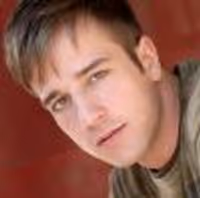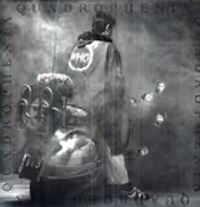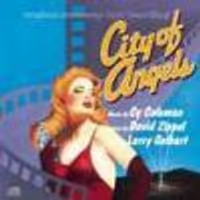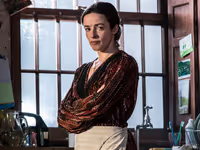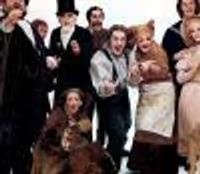Sam Mendes' Cabaret - If you witnessed the production, please help
#50!
Posted: 9/28/11 at 1:10am
"I'll disagree with you on that one as far as Jennifer Jason Leigh goes. She was (to me) the best Sally I ever saw. She was also 100% different than anyone else who did the role before or after her. I remember her as being an extremely manic depressive Sally who was filled with this rage inside of her that I can't even describe. THAT is a performance that deserved to be preserved."
I do believe there is press reel footage of her. ![]()
#51!
Posted: 9/28/11 at 1:57am
Cabaret was one of four shows that I saw my first visit to NYC as a high school senior (traveling from western Pennsylvania), and it was by far the greatest. I saw it with Debbie Gibson and Neil Patrick Harris, both whom I remember as being very good, although I was certainly a less discerning critic at the time, and it was a good number of years ago now.
I remember NPH most of all, I think. Of all things, I can hear his voice with perfect clarity on the line, "She wouldn't look Jewish at all." Strange, but true.
But most of all, predictably, I remember the end. And the silence that greeted it. Cabaret was my first real experience of that sort of theatrical brilliance. (My shows before that on the visit were Rent and Hairspray, I believe.) It was like there was a collective punch to the gut of the entire audience. I can't remember all the details with perfect clarity, but wow can I remember how I felt when it was all said and done.
#53!
Posted: 9/28/11 at 8:33am
Quoted from Taryn's post: I remember NPH most of all, I think. Of all things, I can hear his voice with perfect clarity on the line, "She wouldn't look Jewish at all." Strange, but true.
----------
When I saw the bootleg footage of NPH in this role, when he said "she wouldn't look--JEWISH--at all" there were some uncomfortable titters of laughter from the audience when he said "Jewish", as if some people thought that was supposed to be funny. Don't know if they were anti-Semitic or just idiots. There wasn't a PEEP from the audience at the Emcee's final moment though, I guess they were suitably shocked into silence.
#54!
Posted: 9/28/11 at 9:58am
That's exactly the ambivalence that line is supposed to feel after the Emcee says that line. It's a similar effect as that achieved in "Tomorrow Belongs to Me," which seems at first to be a beautiful folk song and ends as a fascist anthem.
The line actually seemed so offensively anti-Semetic in the original production and made 1967 audiences so uncomfortable that they had to change it to "She isn't a meeskite at all"--a harmless Yiddish joke and a reference to the earlier song that robbed the show of one its most effective moments. The idea--even back in 1967--was that the show is SUPPOSED to make the audience increasingly aware of the creeping Naziism and increasingly uncomfortable by it.
NPH performed it perfectly.
#55!
Posted: 9/28/11 at 10:16am
PalJoey, that's interesting about the 1967 change. I think the subversive hints of the horror that is to come were perfectly handled in the show, and changing "Jewish" to something else would totally take away the power of that moment.
It's just that it shocked me that anyone in this day and age would laugh at that line, as if they thought it was funny, instead of just offensive. I can't explain it, it just gave me the creeps that a modern audience (any post World War II audience) would laugh at that.
It disturbingly reminded me of the time a few years back that Sasha Baron Cohen went to a club in Tucson, AZ. He filmed himself there on stage singing a song called "Throw the Jew Down the Well" as a country western tune---and he had the crowd singing and clapping along with him. It chilled me to the bone.
#56!
Posted: 9/28/11 at 10:22am
Kander and Ebb and Hal Prince intended the line to elicit scattered unthinking titters and they intended you to be made uncomfortable by the laughter of your fellow audience members.
The intention was that those audience members would also catch themselves laughing at what they thought was simply a perfectly timed punchline and, in the end, everyone would realize how easily people slip into bigotry.
I can't vouch for the intentions of Sasha Baron Cohen.
#58Cabaret
Posted: 9/28/11 at 10:37am
They received a lot of pressure from 1967 Jewish groups during the Boston tryout because of the line. A rabbi threatened to organize a boycott. According to Fred Ebb, the ladies of the B'nai B'rith complained that, because the Emcee's dancing partner was wearing a gorilla suit, the implication of the line was that all Jewish women looked like gorillas.
The pressure grew so intense that Hal Prince (as producer) overruled Hal Prince (as director) and told Fred Ebb that he had to change the line or the theater parties that had booked the advance sales would cancel and the show would not have enough of an advance to open on Broadway.
John Kander later said that "Decisions that are made under pressure like that are almost always regretted." And Fred Ebb said that coming up with that second punchline was "one of the most difficult tasks I ever faced in the theater." Hal Prince admitted it had been cowardly of him to insist, but that he didn't regret doing so: The show was more important than that one line.
And they were all happy when Fosse restored it for the movie.
#60Cabaret
Posted: 9/28/11 at 10:46am
It's also possible to laugh at the awfulness of the thinking underlying the line without finding the joke to be actually humorous, just as you can laugh at Hannibal Lechter's dialog without thinking cannibalism is funny.
Of course, I can't speak to the motivation of the people in the audience. But laughter doesn't always denote approval.
#62Cabaret
Posted: 9/28/11 at 1:58pm
I love the Donmar recording, but I don't like how much it's missing. Most notably, no Don't Tell Mama. ![]() I cannot tell you, however, how much I wish I had seen the Mendes revival while it was here. I know there are bootlegs, but none could ever compare, or so I'm told.
I cannot tell you, however, how much I wish I had seen the Mendes revival while it was here. I know there are bootlegs, but none could ever compare, or so I'm told.
#63Cabaret
Posted: 9/28/11 at 9:53pmI saw the tour of Mendes's production when I was 10 years old with Norbert Leo Butz and Teri Hatcher. And I will never forget those final moments. As a child that was always fascinated by the holocaust I just remember the final drum roll and leaping to my feet. It is because of this show that I want to do this for the rest of my life as my living.
"I am sorry but it is an unjust world and virtue is only triumphant in theatricle performances" The Mikado
#65Cabaret
Posted: 9/28/11 at 10:21pm
I actually think this is a great thread...interesting discussion and it didn't deteriorate into the usual personal attacks.
I also saw the show with Molly Ringwald and Raul Esparza. She has a fine singing voice and presence and he (whom I'd never heard of then) was just terrific, especially in his asides to the audience. I loved the dark, grimy decor of the theater and watching the cast wander thru the audience before showtime. It was as unconventional as the show itself. As stated, the stark final moment was powerful and dreadful at the same time; right in keeping with the subtext of the revival. One thing I also recall is that they didn't hand out Playbills until you were exiting the theater after the show. The whole experience was fascinating and very theatrical in the best sense of the term.
#66Cabaret
Posted: 9/30/11 at 3:17pmDid anyone see Teri Hatcher as Sally in the first national tour? The reviews I've seen aren't very pleasant, but I'm wondering if anyone posting here actually witnessed the performance.
Videos


